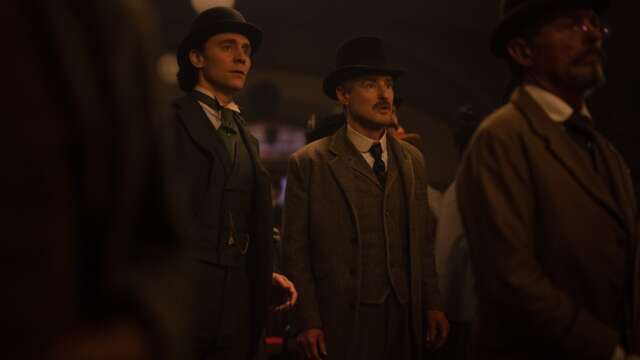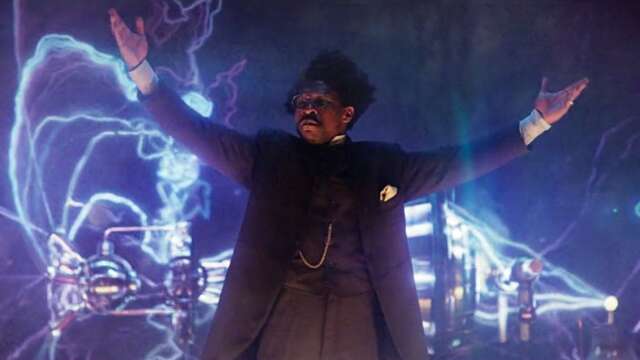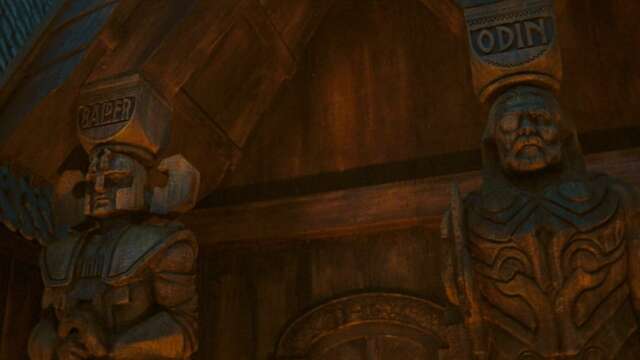Loki Season 2, Episode 3 Easter Eggs and Clues – 5 Things You Missed in "1893"

This week on Loki, we went back in time. All the way back to the 19th century, in fact. While the first two episodes of Season 2 have primarily dealt with the direct fallout from the Season 1 finale, this episode actually moves the story forward in a meaningful way. It just so happens that in order to move forward, they had to go back. Really makes you think.
Warning: This article contains many detailed spoilers for the third episode of Loki Season 2.
This week, Loki swapped out the drab, brutalist hallways of the Time Variance Authority for the retro charms of 1800s Chicago. Just as importantly, however, is that we finally get to check in with Renslayer, making her first appearance of the season in the opening scene. She’s in Chicago in 1868 with Ms. Minutes, who tells her she’s supposed to deliver a package to a certain house.
That package is the TVA field manual, and the house is the home of a child who will grow up to become the man called Victor Timely–a version of He Who Remains, who allegedly set this plan in motion before Sylvie killed him last season. Then, Renslayer moves ahead to 1893, and it’s not long before Loki and Mobius show up in pursuit.
Things are busy in Chicago because the World’s Fair is in town. In our world, this was the World’s Fair that everyone thinks of when that term is used–the World Columbian Expo, as it was actually called, was one of the biggest cultural events the New World had ever seen.
Victor Timely (played once more by Jonatan Majors) is a participant in the fair, naturally. He’s presenting to an audience what looks and sounds like a small version of the Temporal Loom that’s breaking down at TVA headquarters, and he sells it as a time-powered energy generator. A bidding war starts in the audience after the presentation, and Mr. Timely sells the machine for $1,000. But this Loom is just a trick–Timely is swindling these guys, and they get pretty mad once they realize it.
And so we end up with a multi-pronged chase, with Renslayer, Loki and Mobius, and some 1800s crime guys all trying to get to Victor Timely. And, of course, Sylvie also shows up because she wants a piece of any variant of He Who Remains. After some shenanigans on a pretty cool looking old ferris wheel, not to mention a rather large distraction by Miss Minutes, Timely ends up with Renslayer and Miss Minutes at his lab in Wisconsin. Miss Minutes gets a little unhinged–she clearly had a thing for He Who Remains, and is having a meltdown over meeting this new variant of him. So Renslayer shuts her down.
And then Loki and Mobius finally catch up, with Sylvie close behind. Sylvie decides to spare Timely since he hasn’t done any of the bad stuff yet, and then she sends Renslayer to the end of time so she can see that whole mess with her own eyes. And now Loki has to explain all this madness to Victor.
This episode is a lot to take in, and we’ve got several really interesting Easter eggs and hints about what’s going on here while we wait to see what happens next. Let’s dive in.
1. Old-timey version of the Marvel fanfare

As a nod to the setting of this episode, the Marvel fanfare–the music that plays over the Marvel logos at the beginning of this episode–is delivered in the style of an old-timey fairground organ rather than the normal orchestra.
2. Victor Timely’s bootstrap paradox

In delivering the TVA manual to Victor Timely, Renslayer is executing what we know as a bootstrap paradox: a circular time loop in which something in the present causes itself to exist in the past. Victor Timely, trapped in the 19th century, would be nothing without the TVA manual, but instead he has some part to play here because Renslayer brought it to him, supposedly on the orders of his future self.
It’s called a paradox for a reason–you can’t make logical sense of it, or deduce where the cycle began. It simply is. That said, I wouldn’t be surprised if Ms Minutes isn’t being honest about who came up with this plan. I bet it was actually her idea, which would change the situation pretty severely depending on the specifics.

This week on Loki, we went back in time. All the way back to the 19th century, in fact. While the first two episodes of Season 2 have primarily dealt with the direct fallout from the Season 1 finale, this episode actually moves the story forward in a meaningful way. It just so happens that in order to move forward, they had to go back. Really makes you think.
Warning: This article contains many detailed spoilers for the third episode of Loki Season 2.
This week, Loki swapped out the drab, brutalist hallways of the Time Variance Authority for the retro charms of 1800s Chicago. Just as importantly, however, is that we finally get to check in with Renslayer, making her first appearance of the season in the opening scene. She’s in Chicago in 1868 with Ms. Minutes, who tells her she’s supposed to deliver a package to a certain house.
That package is the TVA field manual, and the house is the home of a child who will grow up to become the man called Victor Timely–a version of He Who Remains, who allegedly set this plan in motion before Sylvie killed him last season. Then, Renslayer moves ahead to 1893, and it’s not long before Loki and Mobius show up in pursuit.
Things are busy in Chicago because the World’s Fair is in town. In our world, this was the World’s Fair that everyone thinks of when that term is used–the World Columbian Expo, as it was actually called, was one of the biggest cultural events the New World had ever seen.
Victor Timely (played once more by Jonatan Majors) is a participant in the fair, naturally. He’s presenting to an audience what looks and sounds like a small version of the Temporal Loom that’s breaking down at TVA headquarters, and he sells it as a time-powered energy generator. A bidding war starts in the audience after the presentation, and Mr. Timely sells the machine for $1,000. But this Loom is just a trick–Timely is swindling these guys, and they get pretty mad once they realize it.
And so we end up with a multi-pronged chase, with Renslayer, Loki and Mobius, and some 1800s crime guys all trying to get to Victor Timely. And, of course, Sylvie also shows up because she wants a piece of any variant of He Who Remains. After some shenanigans on a pretty cool looking old ferris wheel, not to mention a rather large distraction by Miss Minutes, Timely ends up with Renslayer and Miss Minutes at his lab in Wisconsin. Miss Minutes gets a little unhinged–she clearly had a thing for He Who Remains, and is having a meltdown over meeting this new variant of him. So Renslayer shuts her down.
And then Loki and Mobius finally catch up, with Sylvie close behind. Sylvie decides to spare Timely since he hasn’t done any of the bad stuff yet, and then she sends Renslayer to the end of time so she can see that whole mess with her own eyes. And now Loki has to explain all this madness to Victor.
This episode is a lot to take in, and we’ve got several really interesting Easter eggs and hints about what’s going on here while we wait to see what happens next. Let’s dive in.
1. Old-timey version of the Marvel fanfare

As a nod to the setting of this episode, the Marvel fanfare–the music that plays over the Marvel logos at the beginning of this episode–is delivered in the style of an old-timey fairground organ rather than the normal orchestra.
2. Victor Timely’s bootstrap paradox

In delivering the TVA manual to Victor Timely, Renslayer is executing what we know as a bootstrap paradox: a circular time loop in which something in the present causes itself to exist in the past. Victor Timely, trapped in the 19th century, would be nothing without the TVA manual, but instead he has some part to play here because Renslayer brought it to him, supposedly on the orders of his future self.
It’s called a paradox for a reason–you can’t make logical sense of it, or deduce where the cycle began. It simply is. That said, I wouldn’t be surprised if Ms Minutes isn’t being honest about who came up with this plan. I bet it was actually her idea, which would change the situation pretty severely depending on the specifics.
3. 1893 World’s Fair

While the episode doesn’t get into this for obvious reasons, the 1893 world’s fair in Chicago was called the World’s Columbian Expo to celebrate the 400th anniversary of Christopher Columbus’ arrival in the New World. The event saw real-life inventor Nikola Tesla present a number of his electric devicesjust like Timely does in this episode.
This is actually the first time a World’s Fair has appeared in the MCU, though you’d be forgiven for thinking there was one in the first Captain America movie. Indeed, that film featured a fake World’s Fair that Steve Rogers and Bucky Barnes attended in New York City in 1942, which was called the Stark Expo. Iron Man 2 also gave us a modern version of the Stark Expo, which was where the climax of the movie took place.
4. Snake oil salesman

Victor Timely’s bit is that of the historical snake oil salesman, a type of con artist during the 19th century known for peddling useless elixirs and tonics that they claim are medicine or some kind of performance enhancer (like snake oil). But Victor is doing a version of the routine that we’re much more familiar with these days: tech folks making big promises that they know they can’t deliver on.
5. Balder

While they explore the fair, Loki and Mobius encounter a display on Norse deities that include carved wooden statues of Odin, Thor and Thor’s half-brother Balder. Loki is very much not amused by his own exclusion from the group. “Why did they include Balder?” Loki asks, miffed. “Nobody’s ever even heard of him.”
While Balder hasn’t shown up in the MCU, Balder the Brave is a Marvel character, and he’s as powerful as you would expect an Odinson character to be. Notably, for example, he’s faster than Thor. This is the first time this character has even been referenced in the MCU, though it was reported that Daniel Craig had been slated for a cameo as Balder in Doctor Strange and the Multiverse of Madness before pulling out of the production due to COVID concerns–John Krasinski’s Mister Fantastic was supposedly his replacement.
Baldur’s Gate, for the record, has absolutely nothing to do with this guy or the Norse god he’s based on.




